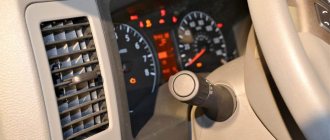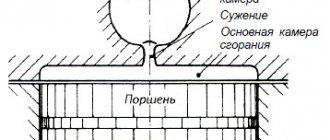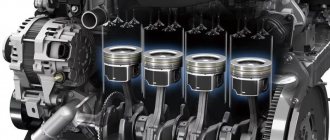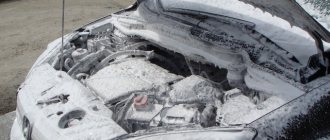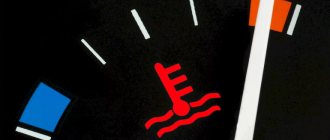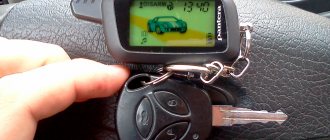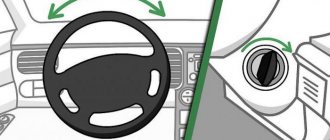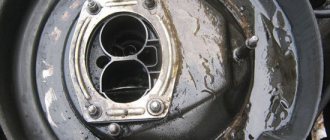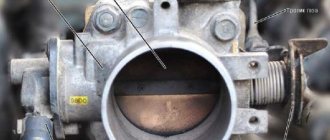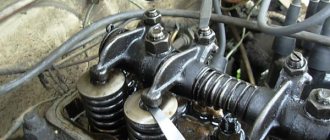Engine knock can lead to significant wear of engine parts such as the cylinder head gasket, elements of the cylinder-piston group, pistons, cylinders and other parts. All this significantly reduces the resource of the power unit until it completely fails. When this harmful phenomenon occurs, it is necessary to diagnose the reason why detonation occurred as quickly as possible and get rid of it. How to do this and what to pay attention to - read on.
What is detonation
Detonation is a disruption of the combustion process of the fuel mixture in the combustion chamber, when combustion does not occur smoothly, but explosively. At the same time, the speed of propagation of the blast wave increases from standard 30...45 m/s to supersonic 2000 m/s (exceeding the speed of sound by the blast wave is also the cause of the pop). In this case, the air-fuel mixture explodes not from a spark coming from a spark plug, but spontaneously, from high pressure in the combustion chamber.
Naturally, a powerful blast wave is very harmful to the cylinder walls, which overheat, the pistons, and the cylinder head gasket. The latter suffers the most and during the detonation process the explosion and high pressure simply burn it out (in slang it is called “blowing out”).
Detonation is typical for engines running on gasoline (carburetor and injection), including those equipped with gas-cylinder equipment (LPG), that is, running on methane or propane. However, most often it occurs in carburetor cars. Diesel engines operate according to a different scheme, and there are other reasons for this phenomenon.
How does dieseling manifest itself?
After the ignition is turned off, there is a natural decrease in the crankshaft speed. At this moment, gasoline, if it penetrates the cylinders, has time to warm up and ignite on its own, that is, without the participation of a spark from a candle. Next, energy is released to the piston, which causes the crankshaft to increase speed.
After increasing the crankshaft speed, the gasoline again does not have enough time to ignite on its own, causing the crankshaft to slow down. This can be repeated several times. The driver feels similar engine operation in the form of jerking, shaking and jerking of the engine after the ignition is turned off. These jerks are caused by a chaotically increasing and then decreasing crankshaft speed. It is noteworthy that the process of self-ignition of gasoline at this moment is similar to diesel, and the phenomenon itself is called “dieseling.” It is quite obvious that diesel ignition is not detonation, and is also different from glow ignition.
Causes of engine detonation
As practice shows, detonation most often occurs on old carburetor engines, although in some cases this process can also occur on modern injection engines equipped with an electronic control unit. Reasons why detonation may occur include:
- Excessively lean air-fuel mixture . Its composition can ignite even before a spark enters the combustion chamber. At the same time, high temperatures provoke the occurrence of oxidative processes, which are the cause of the explosion, that is, detonation.
- Ignition earlier . With an increased ignition angle, the processes of ignition of the air-fuel mixture begin even before the piston hits the so-called top dead center.
- Using the wrong fuel . If gasoline with a lower octane number than prescribed by the manufacturer was poured into the car tank, then there is a high probability of a detonation process. This is explained by the fact that low-octane gasoline is more chemically active and enters into chemical reactions faster. A similar situation will occur if, instead of high-quality gasoline, some kind of surrogate like condensate is poured into the tank.
- High compression ratio in the cylinders . In other words, coking or other contamination in the engine cylinders, which gradually accumulates on the pistons. And the more carbon deposits there are in the engine, the higher the likelihood of detonation occurring in it.
- Faulty engine cooling system . The fact is that if the engine overheats, the pressure in the combustion chamber can increase, and this, in turn, can cause fuel detonation under appropriate conditions.
The knock sensor is like a microphone
These are common reasons that are typical for both carburetor and injection engines. However, there may be another reason for an injection engine - failure of the knock sensor. It supplies the corresponding information to the ECU about the occurrence of this phenomenon and the control unit automatically changes the ignition angle in order to get rid of it. If the sensor fails, the ECU will not do this. At the same time, the Check Engine light on the dashboard will be activated, and the scanner will display an engine knock error (diagnostic codes P0325, P0326, P0327, P0328).
Currently, there are many different options for flashing the ECU in order to reduce fuel consumption. However, their use is not the best solution, since there are often cases when such flashing led to dire consequences, in particular, incorrect operation of the knock sensor, that is, the engine control unit simply turned it off. Accordingly, if detonation does occur, the sensor does not report it and the electronics do nothing to eliminate it. Also, in rare cases, damage to the wiring from the sensor to the ECU may occur. In this case, the signal also does not reach the control unit and a similar situation occurs. However, all these errors can be easily diagnosed using an error scanner.
There are also a number of objective factors that influence the occurrence of detonation in individual engines. In particular:
- Engine compression ratio. Its importance is determined by the design features of the internal combustion engine, so if the engine has a high compression ratio, then theoretically it is more prone to detonation.
- Shape of the combustion chamber and piston crown. This is also a design feature of the engine, and some modern small but powerful engines are also prone to detonation (however, their electronics control this process and detonation in them is rare).
- Forced engines. They usually have a high fuel combustion temperature and high pressure, and accordingly, they are also prone to detonation.
- Turbocharged engines. Similar to the previous point.
As for detonation on diesel engines, the cause of its occurrence may be the fuel injection advance angle, low quality diesel fuel, or problems with the engine cooling system.
The operating conditions of the machine can also cause detonation. In particular, the engine is more susceptible to this phenomenon provided that the car is driving in a high gear, but at low speed and engine speed. In this case, a high degree of compression occurs, which can provoke detonation.
Some car owners also strive to reduce fuel consumption, and to do this they reflash the ECU of their cars. However, after this, a situation may arise where a poor air-fuel mixture reduces the dynamics of the car, while the load on its engine increases, and at increased loads there is a risk of fuel detonation.
What reasons are confused with detonation?
There is a concept called “glow ignition”. Many inexperienced car enthusiasts confuse it with detonation, since with glow ignition the internal combustion engine continues to operate even when the ignition is turned off. In fact, in this case, the air-fuel mixture is ignited by heated engine elements and this has nothing to do with detonation.
Another phenomenon that is mistakenly believed to be the cause of engine knocking when the ignition is turned off is called dieseling. This behavior is characterized by short-term engine operation after turning off the ignition at an increased compression ratio or using fuel that is inappropriate for detonation resistance. And this leads to spontaneous ignition of the air-fuel mixture. That is, ignition occurs as in diesel engines, under high pressure.
Briefly about the main thing
After stopping the engine, there can be no detonation - this unstable “jerking” is called dieseling. This phenomenon does not carry anything dangerous in itself. The reason for its appearance is the flow of fuel into the cylinders when the ignition is turned off. It occurs, as a rule, on carburetor engines with a faulty EMC.
Detonation occurs exclusively when the engine is running and is accompanied by a characteristic metallic ringing. It appears when driving at low speeds under load, when starting off, after refueling with low-octane gasoline and due to incorrect setting of the ignition timing on a carburetor engine. On an injection power plant, the engine knock sensor and the ECU are responsible for the latter.
Without exception, all VAZ cars, from model 2101 to modern versions, are equipped with gasoline power plants, which are a higher priority for all automobile manufacturers.
The normal functioning of any gasoline engine is ensured by a number of factors - maintaining the correct proportion of the air-fuel mixture, the quality of gasoline, the appropriate ignition timing, and the condition of the CPG. If at least one of these factors does not correspond, a negative effect such as detonation may occur.
Signs of detonation
There are a number of signs by which you can indirectly determine that detonation is occurring in the engine of a particular car. It’s worth mentioning right away that some of them may indicate other breakdowns in the car, but it still makes sense to check for knocking in the engine. So, the signs include:
- The appearance of a metallic sound from the engine when it is running . This is especially true when the engine is running under load and/or at high speeds. The sound is very similar to what happens when two iron structures hit each other. This sound is precisely caused by the blast wave.
- Decrease in engine power . Usually, in this case, the engine does not operate stably, it may stall when idling (this is important for carburetor cars), it takes a long time to gain speed, and the car’s dynamic characteristics drop (it does not accelerate, especially if the car is loaded).
Diagnostic scanner Rokodil ScanX for connecting to the car ECU
It also makes sense to give signs of failure of the knock sensor. As in the previous list, signs may indicate other breakdowns, but for injection machines it is better to check the error using an electronic scanner (the most convenient way to do this is with a multi-brand Rokodil ScanX , which is compatible with all cars from 1993 onwards and allows you to connect to a smartphone on iOS and Android via Bluetooth). Such a device will make it possible to see the indicators of the knock sensor and others in real time.
So, signs of a knock sensor failure:
- Unstable engine operation at idle speed;
- a drop in engine power and in general the dynamic characteristics of the car (accelerates poorly, does not pull);
- increased fuel consumption;
- Difficulty starting the engine, this is especially noticeable at low temperatures.
In general, the symptoms are identical to those that occur with late ignition.
Consequences of detonation
As mentioned above, the consequences of detonation in a car engine are very serious, and under no circumstances should repair work be delayed, because the longer you drive with this phenomenon, the more damage the engine and its individual elements are susceptible to. So, the consequences of detonation include:
- Cylinder head gasket combustion . The material from which it is made (even the most modern ones) is not designed to work under conditions of elevated temperature and elevated pressure that arise during the detonation process. Therefore, it will fail very quickly. A broken cylinder head gasket will lead to other problems.
- Accelerated wear of elements of the cylinder-piston group . This applies to all its elements. And if the engine is no longer new or has not undergone a major overhaul for a long time, then this can end very badly, up to its complete failure.
- Cylinder head breakdown . This case is one of the most difficult and dangerous, but if you drive for a long time with detonation, then its implementation is quite possible.
Burnt cylinder head gasket
Damage and destruction of the piston
- Burnout of piston/pistons . In particular, its bottom, lower part. However, it is often impossible to repair it and will only need to be completely replaced.
- Destruction of jumpers between rings . Under the influence of high temperatures and pressure, they can be one of the first to break down among other engine parts.
Cylinder head breakdown
Piston burning
- Connecting rod bend . Here, similarly, in conditions of an explosion, its body can change its shape.
- Burning valve plates . This process happens very quickly and has unpleasant consequences.
Consequences of detonation
Piston burnout
As can be seen from the list, the consequences of the detonation process are the most serious, therefore the engine should not be allowed to operate under its conditions; accordingly, repairs must be performed as quickly as possible.
Recommendations from experienced motorists
In the manufacture of automobile engines, all parts have certain parameters designed for operation in nominal temperature conditions. When an engine detonates, the vehicle is subjected to shock loads that exceed permissible values. Uneven distribution of fuel and oxygen masses leads to unexpected strong explosions.
To identify and prevent cases of detonation, it is recommended to listen to the uniformity of the sounds of the running engine. If unusual tapping or noise is detected, you must stop and turn off the engine. Next, you need to determine the source of the unknown sounds and try to eliminate it.
To avoid devastating consequences, detonation must be constantly monitored. The main thing to remember is that during normal operation there should not be even slight changes in the sound of the motor.
